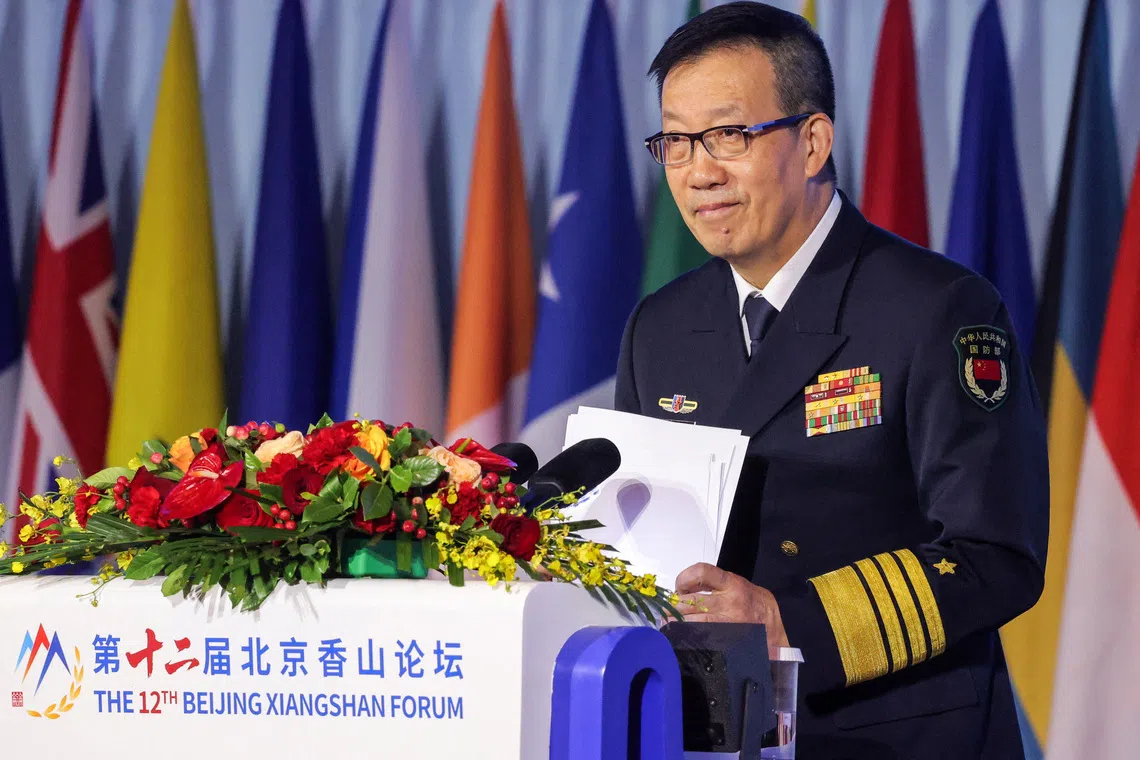China’s defence minister urges greater unity to avoid ‘law of the jungle’
Sign up now: Get ST's newsletters delivered to your inbox

China’s Defence Minister Dong Jun speaking during the Beijing Xiangshan Forum on Sept 18.
PHOTO: REUTERS
Follow topic:
BEIJING – China’s Defence Minister Dong Jun trumpeted Beijing’s efforts to reshape global governance, warning on Sept 18 against an increasingly divided world “defined by the rule of the jungle”, while saying his country’s strong military would be a force for peace.
The remarks come amid simmering tension between China and the United States and its allies and partners over flashpoints across East Asia, including Taiwan and the South China Sea, as well as broader economic rivalries under US President Donald Trump.
Formally opening the Beijing Xiangshan Forum on security, Mr Dong said the world is at a crossroads overshadowed by Cold War thinking, hegemony and protectionism, and has to choose dialogue over confrontation.
“External military interference, seeking spheres of influence and coercing others to take sides will bring the international community into chaos,” he added.
His remarks took veiled swipes at the US and appeared more hawkish than his speech at the forum in 2024, particularly on topics such as tension over democratically governed Taiwan.
“An obsession with absolute superiority in military strength and a ‘might is right’ approach will lead to a divided world defined by the rule of the jungle and disorder,” Mr Dong said.
A strong Chinese military would be a force for peace, he added.
Mr Dong’s remarks follow recent speeches by President Xi Jinping against “hegemonism and power politics” and the large military parade in Beijing in September that showed off a host of new weapons.
Malaysia’s Defence Minister Mohamed Khaled Nordin cautioned that “uncertainties” over the disputed South China Sea could escalate to distrust and tensions between his country and China.
“Our shared security depends on keeping sea lanes free, open and secure,” Mr Nordin said, calling for all parties to rely on international law to peacefully settle disputes.
“Rivalry must be managed responsibly so great power competition does not undermine regional peace.”
His counterpart from Singapore, Mr Chan Chun Sing, echoed Mr Dong’s warning of a divided world, saying “we again risk falling into a similar vicious cycle” of economic upheaval and radical politics that led to World War II.
While saying that China is open to doing its part to uphold the international order, Mr Dong said the People’s Liberation Army would never allow any Taiwan “separatist” attempts to succeed.
“The return of Taiwan to China is an integral part of the post-war international order,” he said, and Beijing is ready “to thwart external military interference at all times”.
China claims Taiwan as its territory and has never renounced the use of force to seize it.
Taiwan’s President Lai Ching-te and his government strongly object to China’s sovereignty claims, saying it is up to the island’s people to decide their own future.
The forum, of about 1,800 officials, military personnel and scholars from 100 countries, comes on the heels of a flurry of diplomacy between Washington and Beijing ahead of a possible summit of their leaders later in 2025.
Mr Dong spoke to US Defence Secretary Pete Hegseth by telephone last week in their first direct exchange, while Mr Xi and Mr Trump are expected to speak by telephone on Sept 19.
In Madrid this week, American and Chinese officials agreed to switch social media app TikTok to US-controlled ownership
However, diplomats and analysts say there is no clear sign yet of deeper military-to-military engagement. “I just don’t think that China understands the United States is no longer going to purchase a defence relationship by (being) accommodating,” security analyst and former Pentagon official Chad Sbragia said on the sidelines of the event ending on Sept 19.
Most Western nations, including the US, have sent relatively low-level diplomatic representatives to the forum, with some saying they seek to learn more about China’s military build-up and opaque military leadership. REUTERS

